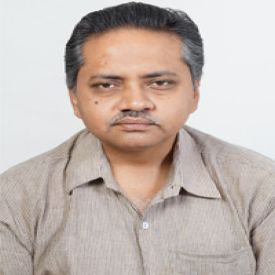Contributor : Profile
Dr. Saswata Ghosh is Associate Professor at the Institute of Development Studies Kolkata (IDSK). He completed his Ph.D. in Population Studies from the Jawaharlal Nehru University (JNU). He obtained the Sir Ratan Tata Postdoctoral Fellowship from the Asia Research Centre of the London School of Economics (LSE) during 2014-15. He also received the International Fellowship for Young Bio-Medical Scientists from the Indian Council of Medical Research (ICMR) during 2012-13. He
served as a Visiting Fellow at the LSE and at Bangladesh Institute of Development tudies (BIDS). Previously, he has worked with the Qatar Statistics Authority (QSA), Centre for Health Policy (CHP), ADRI, Population Council, and Council for Social Development in various capacities. He has co-edited (with Dr. Aparajita Chattopadhyay) the book Population Dynamics in Eastern India and Bangladesh: Demographic, Health and Development Issues. Currently, he serves as a member in the International Advisory Board of Asian Population Studies Journal published by Routledge. He has been published extensively in peer-reviewed journals of international standing. His areas of interest include religious demography, fertility, Family planning and son preference, family demography, field survey methods,demographic estimations, and econometric methods.
Posts by Saswata Ghosh
भारत में हिंदुओं और मुसलमानों के प्रजनन दर में अंतर: एक अपडेट
पिछले शोध के आधार पर सास्वत घोष और पल्लबी दास एनएफएचएस के नवीनतम दौर के आंकड़ों का उपयोग करते हुए हिंदुओं और मुसलमानों के बीच के राज्य और जिला स्तर की प्रजनन क्षमता में अंतर का अनुमान लगाते हैं। वे दर्...
-
 Pallabi Das
Pallabi Das  Saswata Ghosh
Saswata Ghosh  19 मई, 2023
19 मई, 2023
- लेख
Herself, and her child: Are they worse off due to Covid-19?
Lockdowns imposed to contain the spread of Covid-19 led to loss of employment and income. They also created greater food insecurity, with women and children being more vulnerable to such shocks. In t...
-
 Mousumi Dutta
Mousumi Dutta  Saswata Ghosh
Saswata Ghosh  Zakir Husain
Zakir Husain  11 May, 2023
11 May, 2023
- Articles
Hindu-Muslim fertility differentials in India: An update
Building on past research, Saswata Ghosh and Pallabi Das estimate the state- and district-level fertility differentials between Hindus and Muslims using data from the latest round of the NFHS. They sh...
-
 Pallabi Das
Pallabi Das  Saswata Ghosh
Saswata Ghosh  18 April, 2023
18 April, 2023
- Articles
भारत में हिंदू-मुस्लिम प्रजनन दर में अंतर: 2011 की जनगणना के अनुसार जिला-स्तरीय अनुमान
2011 की भारतीय जनगणना के आंकड़े हिंदू आबादी की तुलना में मुस्लिम आबादी की उच्च वृद्धि दर दिखाते हैं। इस लेख में जिला स्तर पर हिंदू-मुस्लिम प्रजनन में अंतर और राज्य स्तर पर उनकी प्रवृत्तियों का एक सटीक...
-
 Saswata Ghosh
Saswata Ghosh  27 अगस्त, 2021
27 अगस्त, 2021
- लेख
Saas, bahu, and ASHA: Information diffusion in rural Bihar
India has made significant progress in improving maternal and child health outcomes, and the contribution of ASHAs – female community health workers – in promoting healthcare-seeking behaviour is ...
-
 Mousumi Dutta
Mousumi Dutta  Saswata Ghosh
Saswata Ghosh  Zakir Husain
Zakir Husain  16 June, 2021
16 June, 2021
- Notes from the Field
क्या राष्ट्रीय ग्रामीण स्वास्थ्य मिशन ने बिहार में मातृ स्वास्थ्य सेवाओं के उपयोग में सुधार किया है?
बिहार सामाजिक-आर्थिक रूप से एक पिछड़ा राज्य है जिसका मातृ और बाल स्वास्थ्य सूचकों के संबंध में रिकॉर्ड लगातार खराब रहा है। यह लेख, स्वास्थ्य पर राष्ट्रीय पतिदर्श सर्वेक्षणों के आंकड़ों के आधार पर इस त...
-
 Saswata Ghosh
Saswata Ghosh  Zakir Husain
Zakir Husain  10 जनवरी, 2020
10 जनवरी, 2020
- लेख
Has the National Rural Health Mission improved utilisation of maternal healthcare services in Bihar?
Bihar is a socioeconomically backward state with a persistently poor record with respect to maternal and child health indicators. Based on data from the National Sample Surveys on healthcare, this art...
-
 Saswata Ghosh
Saswata Ghosh  Zakir Husain
Zakir Husain  18 November, 2019
18 November, 2019
- Articles
Hindu-Muslim fertility differentials in India: District-level estimates from Census 2011
The 2011 Indian Census data show a higher growth rate of Muslim population compared to the Hindu population. This article provides an in-depth picture of Hindu-Muslim fertility differentials at the di...
-
 Saswata Ghosh
Saswata Ghosh  27 March, 2019
27 March, 2019
- Articles




